Patent Rolls: entries for Yorkshire
(1275-1276)
Calendars of the patent rolls of the reign of king Edward I are printed in the Calendars of State Papers: but these cover only a fraction of the material on the rolls. From 1881 to 1889 the reports of the Deputy Keeper of the Public Record Office also include calendars of other material from the rolls - about five times as many entries as in the State Papers - predominantly mandates to the royal justices to hold sessions of oyer and terminer to resolve cases arising locally; but also other general business. The calendar for the 4th year of king Edward I [20 November 1275 to 19 November 1276], hitherto unindexed, is covered here.RYTHE. Cost: £6.00.  | Sample scan, click to enlarge
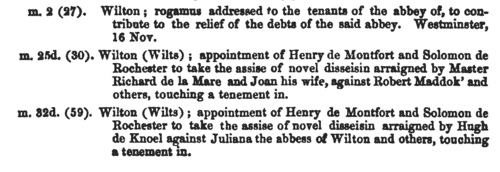
|
Yorkshire Inquisitions
(1241-1283)
Inquisitions post mortem are inquiries as to the real estate and heir of each person holding in capite or in chief, i. e. directly, from the Crown, or whose estates had been escheated or were in ward. The age and relationship of the heir are usually recorded. Inquisitions ad quod damnum enquired as to any activities (including maladministration by local officials) that had resulted in any material loss to the Crown. Both sets of inquisitions for this period were edited by William Brown for the Yorkshire Archaeological and Topographical Association, and printed in 1891. This index covers all names mentioned, including jurors, tenants, &c. RYTHE. Cost: £4.00.  | Sample scan, click to enlarge
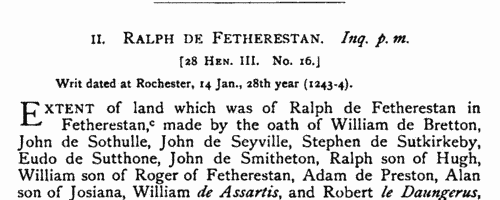
|
Close Rolls
(1429-1435)
The close rolls of the 8th to 13th years of the reign of king Henry VI record the main artery of government administration in England, the orders sent out day by day to individual officers, especially sheriffs of shires: they are an exceptionally rich source for so early a period. There is also some material relating to Wales, Scotland, Ireland and the English possessions in France. Also included is the Exchange Roll of 1424 to 1434, of licences to transmit sums of money out of the realm.RYTHE. Cost: £4.00.  | Sample scan, click to enlarge

|
Close Rolls
(1441-1447)
The close rolls of the 20th to 25th years of the reign of king Henry VI record the main artery of government administration in England, the orders sent out day by day to individual officers, especially sheriffs of shires: they are an exceptionally rich source for so early a period. There is also some material relating to Wales, Scotland, Ireland and the English possessions in France. RYTHE. Cost: £4.00.  | Sample scan, click to enlarge

|
Common Pleas: Wiltshire
(1558)
Pleas at Westminster Michaelmas term, 5 & 6 Philip & Mary and 1 Elizabeth, 1558. The court dealt with civil cases: debt, detinue, slander, assault, theft, breach of covenant, formedon, novel disseisin, &c. Each case is marked in the margin with the name of the county to the sheriff of which the writs were issued. Most often, but not necessarily, this would be the county of residence of the defendant. This calendar of the original formulaic record in abbreviated Latin on parchment has been made by David Bethell, preserving all individual detail from each case. The Latin text is translated: English phrases and passages are preserved literatim, in bold. CP 40/1176 mm.1-100RYTHE. Cost: £8.00.  | Sample scan, click to enlarge
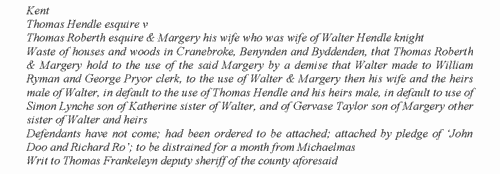
|
Middlesex Entries in the Court of King's Bench (1558)
The Coram Rege Chief Justice's Roll for Michaelmas 5 & 6 Philip & Mary and 1 Elizabeth with cases heard at Westminster of litigants from throughout England
RYTHE. Cost: £8.00.  | Sample scan, click to enlarge
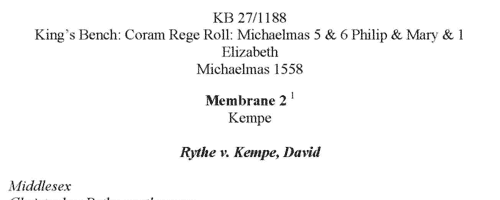
|
Wiltshire Entries in the Common Pleas (1558)
The Common Roll of the Common Pleas records litigation before the justices de Banco from throughout England.
RYTHE. Cost: £8.00.  | Sample scan, click to enlarge
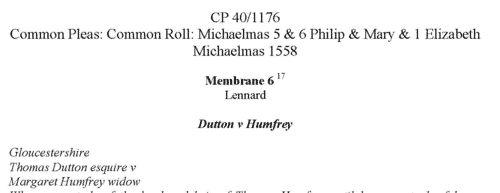
|
London and Middlesex Feet of Fines
(1485-1569)
Pedes Finium - law suits, or pretended suits, putting on record the ownership of land in London and Middlesex.RYTHE. Cost: £4.00.  | Sample scan, click to enlarge

|
Liegemen and Traitors, Pirates and Spies
(1580-1581)
The Privy Council of queen Elizabeth was responsible for internal security in England and Wales, and dealt with all manner of special and urgent matters
RYTHE. Cost: £4.00.  | Sample scan, click to enlarge
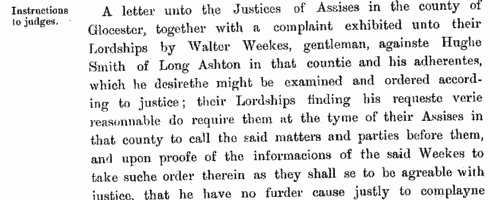
|
Scottish litigants, rebels and cautioners
(1592-1599)
The Privy Council of Scotland exercised a superior judicial authority in the kingdom, and consequently received and dealt with a constant stream of petitions, as well as dealing with the internal security of the state. This register of the council from August 1592 to May 1599, in the reign of king James VI, was edited by David Masson and published under the direction of the Deputy Clerk Register of Scotland in 1882. The publication brings together the contents of the principal register (Acta Secreti Concilii) with acts and bands (bonds) of caution (surety) from the registers called Acta Cautionis (pp 561-730); Acts and Ordinances relating to the Borders and the North (731-748); and Miscellaneous Privy Council Papers (749-769). Many of the individuals mentioned are the complainants, those of whom they complained, and the sureties on both sides: at this period, many of the complainants are alleging serious attacks, often of a feuding nature. Many of the bonds entered into by the cautioners are promises to keep the peace towards such enemies. Failure to answer to the council when summoned was a serious contempt, leading to being denounced a rebel, with serious consequences.
RYTHE. Cost: £4.00.  | Sample scan, click to enlarge

|
Research your ancestry, family history, genealogy and one-name study by direct access to original records and archives indexed by surname.












